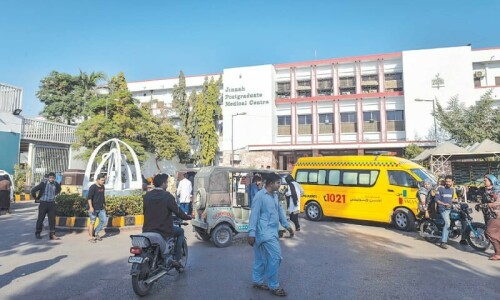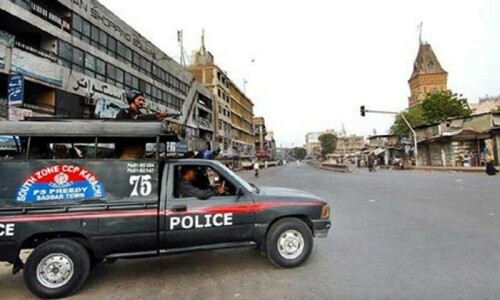
KARACHI: Decent work conditions, fundamental principles and rights, employment, income opportunities and social security remained at the core of discussions during the launch of the Pakistan Institute of Labour Education and Research (Piler) annual report Status of Labour Rights in Pakistan 2015 at the Karachi Press Club on Wednesday.
“You can tell a lot about the conditions of our labour from the fact that we don’t count them as a part of our workforce. They have more or less become invisible in the face of outsourcing and so much informality in the formal sector,” said Piler director Karamat Ali.
“With outsourcing or giving contracts to others to bring in the manpower, the persons who actually do the work have no social security as they are not even registered workers. And here when people don’t even get their pension on time, you can imagine the condition the contractual employee,” he added.
“Once upon a time, in order to document the status of labourers and the conditions they work in, which is still a legal requirement mind you, the government had some departments and publications such as the Manpower Division and the quarterly Labour Gazette that also kept an eye on the goings-on in our labour courts. The publications have been discontinued, though the departments are still there but non-functional. Still no one cares to find out why these offices on which our tax money is spent are doing no work,” he lamented.
“Although the minimum wage of Rs13,000 is unrealistic and not enough, even that is not paid to the labourers who get two to three thousands less than this amount. There also used to be a cost of living allowance, which increased in view of the cost of living as per the times. It provided a cushion if the real wages were not enough but that is gone, too,” he said.
“To cut down on extra expenditures a poor labourer, whose condition is getting worse instead of improving, will eat one chapati instead of two, try to avoid seeing a doctor when sick, pull out his daughters from school so that the sons can study at least and so on. All these things need to be reflected upon,” he concluded.
Senior trade union leader Habibuddin Junaidi said that because of the contractual third party system and outsourcing for labour 99 per cent of labour in Karachi were not a part of any labour union. “These poor workers are not even allowed to have food from the canteens of offices where they work. Usually, you see them eating at Saylani or the like,” he added.
Jeff Brown, a member of the Trade Union Council in Manchester, UK, said that the state of labourers in Pakistan had international significance also due to Pakistan’s geopolitical position as Pakistan was a major part of the world economy. “I have read Piler’s report and the portion in it about union power sharing by Zeenia Shaukat is extremely interesting as it talks about labour organising itself, showing democracy and solidarity, which is a positive step,” he said.
Meanwhile, explaining how this fifth report on the status of labour rights in Pakistan had been prepared, senior research associate with Piler Zeenat Hisam said that surveys and media coverage were used as the basis of their findings that were then reviewed by experts. “Its first section shares insights on resistance put up by workers in various sectors and occupations. Despite the disabling legislation and repressive tactics used by the state and employers that make union formation and collective bargaining extremely difficult, the workers in the public and private sectors have continued to raise their voices against injustices and violation of their rights,” she said.
“The second section,” she said, “highlights two key issues — the current status of the labour inspection system in Pakistan and gender wage differential, that is, discrimination against women regarding wages. It also contains an exclusive article analysing the tangible support and solidarity extended by Faisalabad power-loom workers to the marginalised brick kiln workers in Punjab,” she said.
Published in Dawn, April 7th, 2016











































Dear visitor, the comments section is undergoing an overhaul and will return soon.